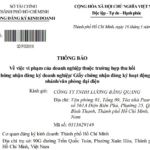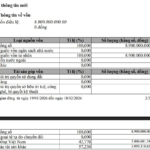The E-commerce Boom and the Livestream Economy
According to the Ministry of Industry and Trade, Vietnam’s e-commerce market reached over $25 billion in 2024, growing at a rate of 20% year-on-year. This accounts for approximately 10% of the country’s total retail and consumer services, ranking third in Southeast Asia. A significant driver of this explosive growth is livestreaming, with an average of 2.5 million sessions per month hosted by over 50,000 sellers, as reported by AccessTrade Vietnam. However, this phenomenon largely operates within an “informal economy,” where substantial revenues flow through personal accounts, often uninvoiced and untaxed, leading to significant losses for the national budget.
At the July 28 workshop in Ho Chi Minh City discussing the Draft E-commerce Law, Ms. Lê Hoàng Oanh, Director of the E-commerce and Digital Economy Agency (Ministry of Industry and Trade), emphasized that livestream selling is entering a phase of professionalization. She stressed the need for strict compliance with invoicing, tax declarations, and transparency to create a sustainable business environment.
Is the Golden Age of Blockbuster Livestreams Fading?
Since TikTok Shop entered the market in 2022, leveraging Key Opinion Leaders (KOLs) and Key Opinion Consumers (KOCs) as its core strategy, the platform has fueled a new era of influencer-driven commerce. This approach catapulted many individuals into “livestream superstars,” reshaping the retail landscape.
By 2024, this trend peaked, with numerous record-breaking sessions hosted by influencers like Phạm Thoại, Võ Hà Linh, and Quyền Leo Daily. Revenues soared into the tens, even hundreds of billions of VND within hours, showcasing the immense purchasing power of social commerce.

Quyền Leo Daily’s 100 billion VND livestream session – Illustrative image
|
However, by 2025, the livestream frenzy began to wane. High-revenue “blockbuster” sessions became less frequent, amid growing concerns over false advertising and subpar product quality. As consumer trust eroded, brands and sellers grew more cautious in partnering with KOLs/KOCs.
Legal Risks in Multi-Tiered Business Structures
The influence of individuals has been harnessed to build complex, multi-tiered business ecosystems, blurring the lines between “online sellers” and “enterprises.” The case of Hoàng Hường exemplifies this intricate structure, adding to a list of high-profile figures like Hằng Du Mục, Quang Linh Vlogs, Gia đình Hải Sen, and Cún Bông, who once symbolized digital creativity but now face legal repercussions.

Ms. Hoàng Thị Hường
|
Preliminary investigations revealed that Hoàng Hường established a network of 18 companies and 25 business households, generating revenues in the trillions of VND. However, a significant portion of these transactions allegedly went unrecorded in accounting books. This typical structure involves a central individual, satellite companies, a multi-tiered affiliate network, large cash flows through personal accounts, and opaque financial management.
When revenues surpass individual management capabilities, legal risks inevitably arise. This is often due to a lack of governance and control systems suited to the scale of operations. As revenues balloon, tax, accounting, and legal frameworks struggle to keep pace, obscuring the distinction between an “individual seller” and a “corporate entity.”
The Paradox of Consumer Trust
Despite recurring scandals and risks, consumers continue to shop via livestreams. Nielsen IQ Vietnam reports that Vietnamese consumers spend an average of 13 hours weekly watching livestreams, with 95% of online shoppers having made purchases through this channel. AccessTrade and Metric data show conversion rates of 20-30%, outperforming other sales channels.
This persistence is partly due to consumer habits. Livestreaming has become an integral part of online life, blending entertainment with convenience. Competitive pricing and attractive promotions also play a key role. Additionally, consumers often trust individual sellers—KOLs/KOCs who engage directly and persuasively—more than distant, large brands.
Ms. Nguyễn Anh, 25, from Hanoi, shared: “In livestreams, I focus only on prices and gifts. If it’s cheap with lots of freebies, I buy… Most KOCs and KOLs present products superficially, so the actual benefits remain unclear.”
However, this trust is fragile. When counterfeit goods, false advertising, or livestream scandals surface, the impact extends beyond financial losses to shattered confidence. The market suffers, legitimate businesses are affected, and violators often disappear, leaving affiliates and consumers to bear the consequences.
Regulatory Challenges
The root of the issue lies not only in individual behavior but also in policy gaps. Current laws lack a clear framework for “content creator entrepreneurs”—individuals operating and profiting like businesses. The government is working to regulate livestream commerce through measures like seller identity verification and transaction transparency. However, many argue that legal provisions alone are insufficient without ethical compliance and professional integrity from participants.
The “influencer economy” is not inherently negative; it reflects creativity and entrepreneurship. Yet, when growth outpaces governance, “personal empires” become financial risks. As the line between individuals and enterprises blurs, regulatory systems must adapt faster—not just to control, but to ensure market stability and bolster trust in the digital economy.
– 08:09 13/10/2025
Government Party Congress: Striving for High Economic Growth in 2026-2030
The Government’s Party Committee for the 2025-2030 term has set an ambitious goal: by 2030, Vietnam aims to become a modern industrialized developing country with high-middle income, ranking among the top 30 global economies and 3rd in ASEAN. To achieve this, the target is to sustain high economic growth rates from 2026 to 2030 while ensuring major macroeconomic balances.
Proposing a Shift from Minimum Wage to a Living Wage for Two Children
Alongside a phased adjustment to the retirement age, Professor Nguyễn Thiện Nhân proposes transitioning from a minimum wage system to a living wage that adequately supports two children.



















